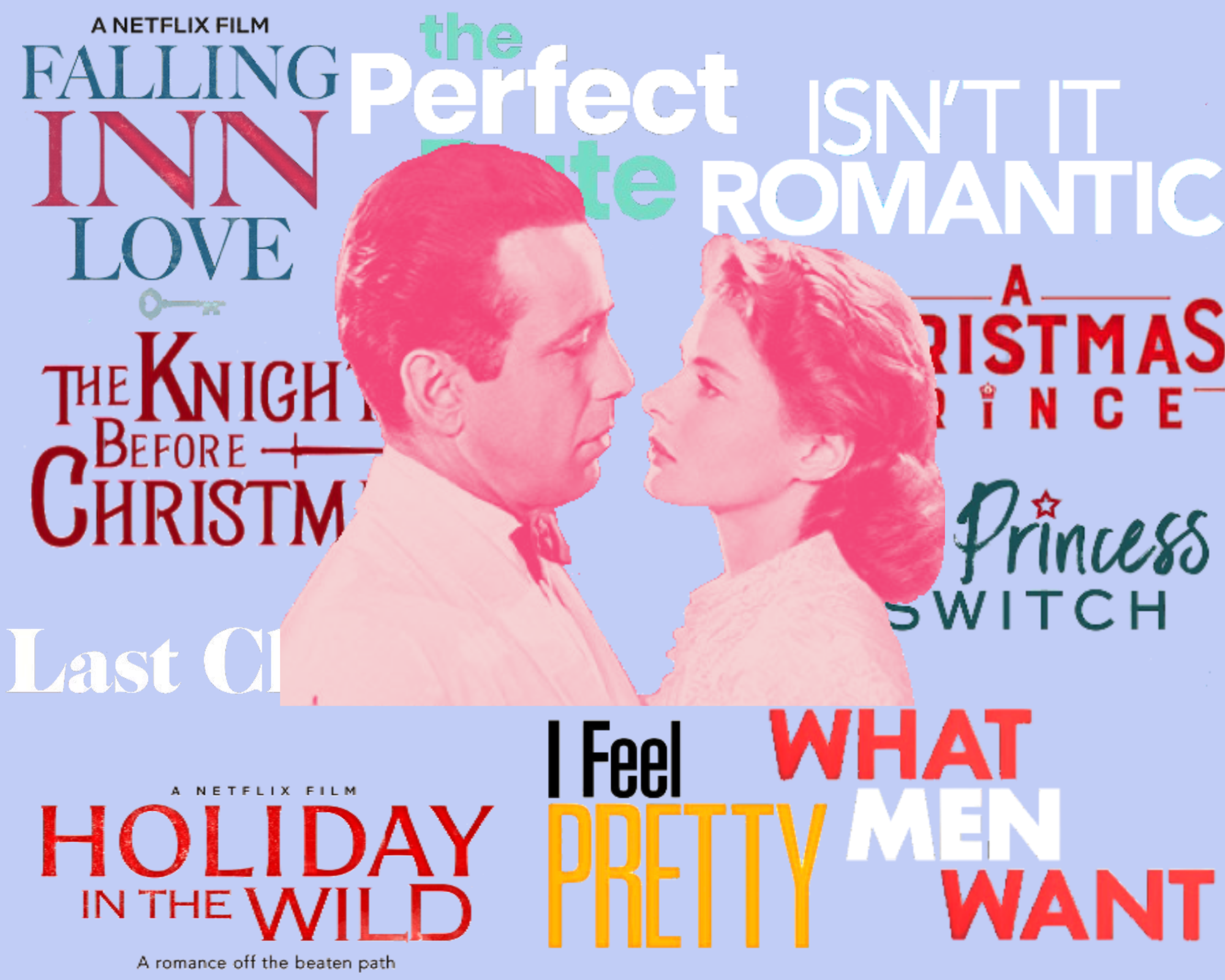Featured image photo property of Warner Bros. and logos courtesy of Netflix, Paramount Pictures, Universal Pictures, and Warner Bros. Illustration by Elisabeth Oster.
The scene opens on a picturesque view of the African savanna as Kate (Kristin Davis), a recent divorcee, frolics with elephants on-screen—all while falling in love with Derek (Rob Lowe), a slightly douchey, but ultimately charming local. Oh, and did I mention it’s Christmas?
This is the entire plot of Holiday in the Wild, Netflix’s newest entry into its burgeoning romantic comedy selection. Aside from the aforementioned plot points, the movie also contains the obligatory first confrontational conversation with the love interest, a bonding musical montage, a mistletoe scene, and yet another montage of the love interests yearning for each other while in the “real” world.
Although romantic comedies have always been known to be lighter fare compared to an intense thriller or somber drama, they also used to be considered as a legitimate work of film. From classic cinema pieces like Casablanca and Sabrina to more modern examples such as When Harry Met Sally and My Big Fat Greek Wedding, romantic comedies earned a place in the cultural conversation. Their magnetism stemmed from the fact that they depicted normal people illustrating the basis of human interaction: love.
Watching characters who felt authentic and flawed, falling in love has captivated audiences for generations merely because it portrays emotions most familiar to an audience. It’s fair to say most people won’t relate to James Bond infiltrating a Soviet agency or teenagers taking down horror villain Freddy Krueger—it’s wholly escapism. But with romantic comedies, its escapism is tethered in reality. The genre provides an introspective look at how love defines humans and how that love interacts with varying personalities, outlooks, and social contexts.
Casablanca investigates human desperation under the backdrop of political strife created by World War II. Sabrina saw Audrey Hepburn trying to unthaw a business-minded Humphrey Bogart under the themes of maturation, family responsibility, and the beauty of spontaneity. When Harry Met Sally explores the complications of friendship and sexual tension. My Big Fat Greek Wedding provides commentary on the tensions between ethnic culture and romance. Since then, however, we’ve entered an era of shallow paint-by-numbers romantic comedies under the guise of being “so bad, they’re good.”
Once the mid-2000s hit, romantic comedies had essentially died out, barely existent at the box office with the domination of big-budget action movies. That is until Netflix stepped in releasing critically-acclaimed movies To All the Boys I’ve Loved Before and Set it Up. In response to Netflix’s efforts, media outlets claimed such films “resurrected the rom-com” and dismissed allegations of a dying genre.
The moment Netflix resuscitated the pulse of meet-cutes and low-stakes mishaps, larger production companies caught a glimpse of hope for romantic comedies on the big screen. This spark of audience interest brought a parade of theatrically-released movies such as Isn’t it Romantic, What Men Want, I Feel Pretty, and Last Christmas. Some of the entries, particularly Isn’t it Romantic sought to shove as many romantic comedy tropes into a feature-length film under the disguise of satire. But while the movie made an effort to poke fun at the cliched perfection of a standard rom-com, it swiftly fell into the same trap it attempted to mock.
Despite efforts for reinvention, all of these films follows the significantly more shallow version of a romantic comedy established by Netflix to varying degrees. A factor that didn’t vary between each film was the lukewarm critical response to all of them. This presented a crucial turning point for the present genre incarnation—movies of the same quality and depth were now being praised on streaming platforms and panned as a theatrical release. With the downgrade in quality that perfectly fit streaming standards, romantic comedies were no longer seen as a part of cinema; the genre was no longer award-worthy, but binge-worthy.
After Netflix established the parameters for the modern rom-com, the stream of nearly-identical movies continued releasing as Netflix began entering Hallmark territory. Although Hallmark Christmas movies had already found their place in popular culture for their cheesy, low-production offerings, Netflix brought them to younger, mainstream audiences starting with A Christmas Prince. A movie with a fictional kingdom, a pathetic depiction of a journalist, and a family bloodline scandal received an inexplicable Rotten Tomatoes score of 73 percent.
Purposely cringey and cliché movies certainly have their place in society and can provide much-needed entertainment and comfort. However, for romantic comedy as a whole, the trends seem to send the message that the genre can no longer be anything but. Each carbon copy movie of boy meets girl—whether they’re remodeling an inn in New Zealand, prancing around a fictional land called Belgravia, or protecting elephants in Africa—sends the message that romantic comedies aren’t worthy of depth when love can be one of the most complex aspects of human identity.
In a time when superhero movies and violent films have dominated the blockbuster space, there’s barely any scene or character for the average moviegoer to relate to or find familiarity in. As fun as it is to be transported into worlds filled with fantastical superpowers and to experience adrenaline, all within the comfort of a movie theater seat, there’s comfort in familiar characters taken from our own streets to the big screen. Romantic comedies used to be that space to showcase authenticity and normalcy not seen in the standard Hollywood glamour and trove of CGI effects.
The new era of romantic comedies only offers up characters with thin development reciting lines that seem almost more unbelievable than half of the population dissolving à la Avengers Infinity War. Wistful, beautiful lines delivered convincingly by Audrey Hepburn in Sabrina: “I have learned how to live, how to be in the world and of the world, and not just to stand aside and watch. And I will never, never again run away from life, or from love, either” are now replaced by Rob Lowe saying to his love interest with dead-pan sincerity: “Without change, there would be no butterflies.” Maybe romantic comedies are dead after all.

